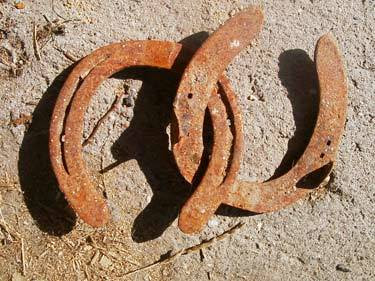Farrier Apprenticeships
“Practice makes perfect.” That truism could never be more right than when speaking about apprenticing. Where school teaches the necessary foundations for learning a trade, an apprenticeship provides the opportunity to repetitively apply the skills learned at school in a real world work setting until those skills become second nature. It’s this valuable “learning on the job” work experience that makes apprenticeships so valuable, and why it’s highly recommended that farriers take the time to apprentice under a knowledgeable mentor.
Since farriery is regulated in the UK, aspiring farriers in that country must undertake a four year and two month apprenticeship program under the tutelage of an Approved Training Farrier (ATF). To be eligible for apprenticeship, you first need to satisfy the minimum academic requirements (see www.farriertraining.co.uk for details) then contact an ATF who will propose you as a candidate and employ you during your period of apprenticeship. According to Apprenticeships, the farrier industry only accepts about 100 apprentices each year in the UK.
In most of the world, farriery is not government regulated and as such does not require attending school or apprenticing before working as farrier. Farrier apprenticeships range from the informal—asking a friend to show you the trade in his spare time now and then or shadowing them—to more formal arrangements where apprentices work on a regular basis.
Some recommend apprenticing before attending a farrier school so that you already know the basics and will be better able to grasp what you’re learning in school. Generally people attend school first then apprentice before working.
What will I learn?
In a farrier apprenticeship you’ll get to practice the routine hands-on skills common to the trade, such as forging and pulling shoes and cleaning feet (see “What does a farrier do?” for more details). You’ll also pick up the business of the trade by seeing the farrier dealing with clients, which is invaluable experience to have when starting off your career.
Who to look for in a mentor
When looking for a mentor, the obvious choice would be a really knowledgeable, seasoned veteran of the trade, but that’s not always the case. The more experienced someone is, chances are the busier they are and the more people they have asking them for favours. Sometimes a far less experienced mentor could be better than the guy who has been doing it his whole life if he’s patient, has time to explain things and is a good teacher. Another thing to consider: even though someone is good at something, it doesn’t mean they’ll make a good teacher.
How to find a mentor
Since there’s a limited number of experienced farriers, finding one to mentor you could prove a challenge. Your school could be a fine resource to connect you, but with a number of students going through their program every year, there’s only so much they can do to help you. As always, the best way to find a mentor is through a personal connection. So tap into your social network and ask your friends and family if they know anyone. If all else fails, cold call. Few people just pick up the phone and ask someone for a favour, so if you’re the one who does and happen to catch someone on a good day, you may get lucky!
Questions to ask a potential mentor
Before committing to an apprenticeship, it’s important to ask a few questions to clarify whether or not apprenticing with this person will work out:
- How much time do they have to spend with you?
- What kind of horses will you be working on? (If you’re practicing on all the difficult horses, you’ll have a much harder time)
- How many horses will you treat? (If you’re sitting around all day, you’ll be wasting your time)
- What kind of work will you be doing / What will you learn?
- Where will you be working?
If the answers to those questions sound good and you have a good rapport with the mentor, go for it. Your farrier career will benefit greatly from this much-needed boost at this early stage in your career!
Here’s a video about the benefits of apprenticing:
NEXT PAGE: Farrier training alternatives >>
image 1: Pixabay










I am currently looking to start an apprenticeship with someone in or around the Virginia Beach Area, I am A high School Junior, 16 Years old, and Have a lot of experience around horses, I am planning to attend TCC This Fall and I am wanting to become an Equine Veterinarian, I learned that being a Farrier can help me prepare for this, and I would love to be able to learn this skill and become a certified Farrier myself, I want to do this because I hope to one day own my own boarding facility, or to own my own horse and be able to support myself, as well as my horse. I am hard working and reliable, I also take pride in working hard, as well as punctual.
I have completed my collage study’s at Morton Morell last year and live in Plymouth and now have reliable transport, willing to re locate to find my apprentaship partner. currently employed full time while looking for a placement.
my name is Brandon and iam looking to become an apprentice, any information would be greatly appreciated
Hi Brandon, that's great news that you're thinking about becoming a farrier! A good next step would be to contact some farriers in your area and ask about what you might need to start an apprenticeship with them. Lots of farrier enroll in farrier school, but your local farriers will be able to guide you as to whether you might be able to get started with an apprenticeship right away. Good luck!